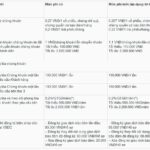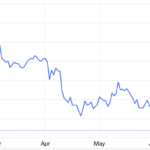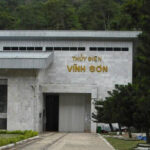In the draft amendment to Circular 126 guiding the Law on Tax Administration, the Ministry of Finance proposes to clarify the timing of tax deduction and declaration for income from dividends and bonuses in the form of securities to avoid prolonging tax obligations.
Specifically, the Ministry of Finance proposes that personal income tax (PIT) will be deducted, declared, and paid immediately when investors receive dividends and bonuses in the form of shares, instead of waiting until the shares are sold as is currently the case. The issuing company will be responsible for deducting and paying the tax on behalf of the individual.
According to an inspector from the Tax Department of Region II, under the current Personal Income Tax Law, investors receiving cash dividends are already subject to a 5% tax rate, which is withheld and paid by the paying company. For dividends or bonuses in the form of shares, investors only pay tax when they sell the shares, including a 5% tax on the par value (VND 10,000) and 0.1% on the transfer value, collected by the securities company.
However, in reality, many large investors often hold their shares for the long term or do not sell the shares received from dividends, resulting in a temporary loss of tax revenue for the state budget.
To address this issue, the Ministry of Finance intends to collect tax as soon as the shares are allocated, while also determining the share price at the time of allocation to calculate the tax liability, ensuring timely budget revenue. According to this proposal, securities companies will separate the shares received from dividends to collect personal income tax. Later, when investors sell the shares, the 0.1% tax on the transfer value will not be collected, avoiding double taxation.
Nonetheless, according to the inspector from the Tax Department of Region II, collecting tax immediately upon receipt of share dividends may pose challenges, as many investors may not have readily available cash to pay the tax. Additionally, if tax continues to be collected upon the sale of shares, price fluctuations may have occurred, making it difficult to determine the accurate tax amount.

Illustrative image
This draft regulation has also faced mixed reactions from experts and investors. The head of brokerage at VPS Securities Company opined that even at the draft stage, the regulation has revealed its irrationality, prompting backlash from investors. He argued that when receiving dividends in shares, investors have not actually gained any benefit but are already required to pay taxes, whereas the share price in the market could very well decline, resulting in losses if sold.
Sharing the same view, Mr. Phu Hoai, an investor in An Lac ward, Ho Chi Minh City, stated that he is willing to fulfill his tax obligations when he makes an actual profit. However, receiving dividends in shares does not always bring benefits, as the share price may drop immediately after the purchase, leading to a decrease in asset value. Meanwhile, investors already bear taxes and fees when receiving cash dividends or selling shares.
Dr. Le Dat Chi, Head of the Finance and Banking Faculty at the University of Economics Ho Chi Minh City, also disagreed with the proposal to collect tax immediately upon receipt of share dividends. He pointed out that the nature of receiving dividends in shares means that investors have not yet received cash flow, so it is unreasonable to oblige them to pay taxes immediately. Furthermore, the current tax collection method is also inappropriate because only when investors sell shares can the tax authority determine the dividend portion arising from the shares.
“Since the nature of distributing dividends in shares is actually just dividing the number of shares, and the share price has been adjusted downward accordingly, it would be more reasonable to collect tax at the time of sale,” said Dr. Le Dat Chi.
Meanwhile, leaders of several securities companies in Ho Chi Minh City stated that they are capable of implementing the tax collection as proposed by the Ministry of Finance. The Ministry only needs to set a reasonable share price and tax rate to ensure budget revenue while facilitating investors and securities companies in fulfilling their tax obligations.
“Brokerage Fees Rise as VAT Takes Effect”
The recent introduction of a new value-added tax law has led to a stir in the stockbrokerage community. With a 10% tax rate now applicable to certain previously exempt securities operations, brokerages are having to adjust their service fee structures accordingly. This has sparked a wave of announcements from brokerages, notifying their clients of the impending changes.
“The Cooling Down of Dong Anh’s Land Market in Hanoi: From Sizzling Hot to…”
“East Anh’s land plots were once a ‘hotspot’, experiencing rapid price hikes and attracting investors from far and wide. This surge in popularity transformed the area into a bustling hub of real estate activity, with investors scrambling to snap up these lucrative plots.”
The Green Energy Conundrum: Vinh Son – Song Hinh Hydro Power’s Tax Troubles
The Vinh Son – Song Hinh Hydropower Joint Stock Company has been found guilty of administrative violations pertaining to tax regulations. As a consequence, the company has been ordered to pay fines and back taxes totaling over VND 2.2 billion.





![[Photo Essay]: Experts, Managers, and Businesses Unite to Forge a Path Towards Sustainable Green Industry](https://xe.today/wp-content/uploads/2025/07/z678592918-218x150.jpg)




































